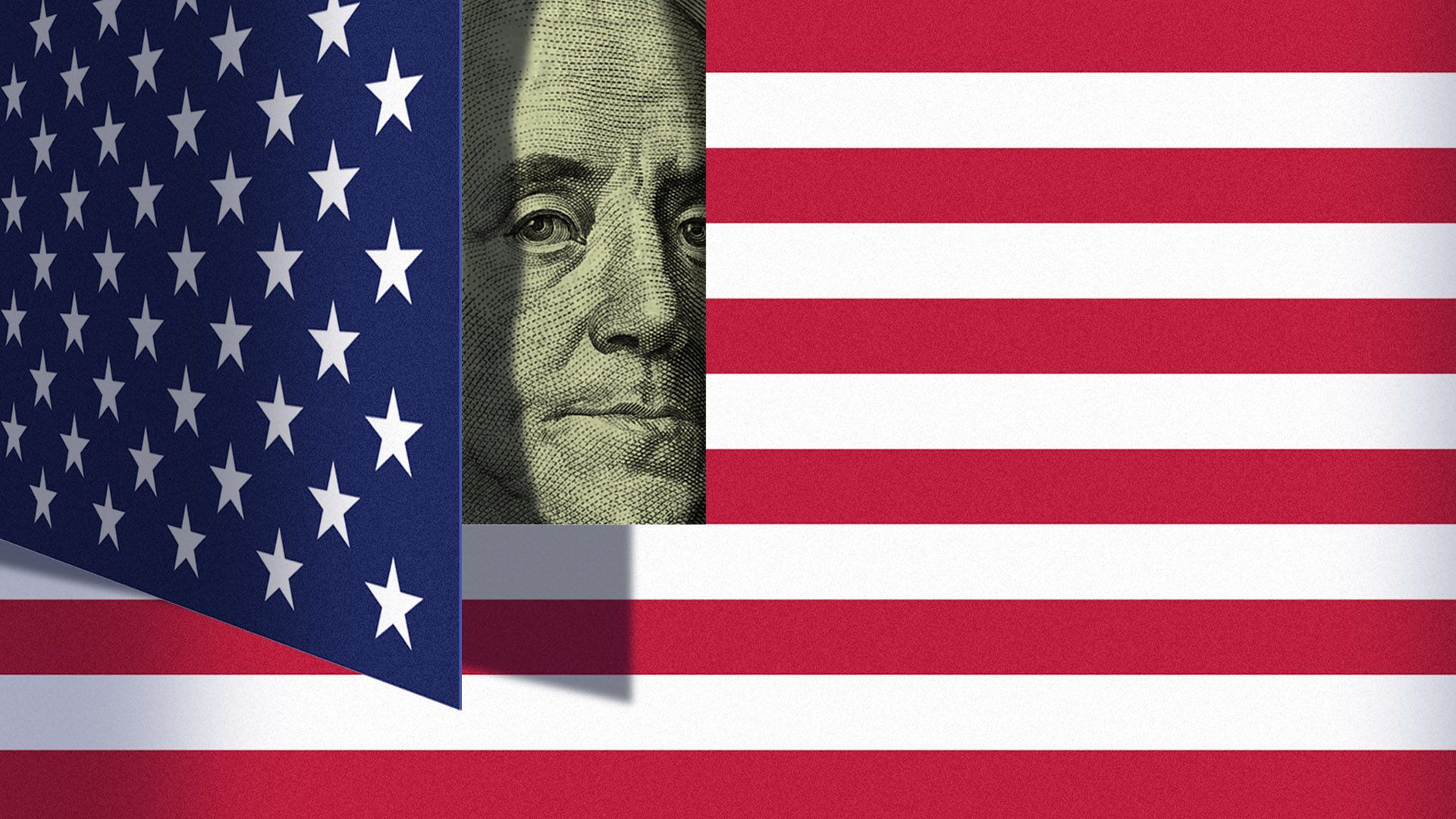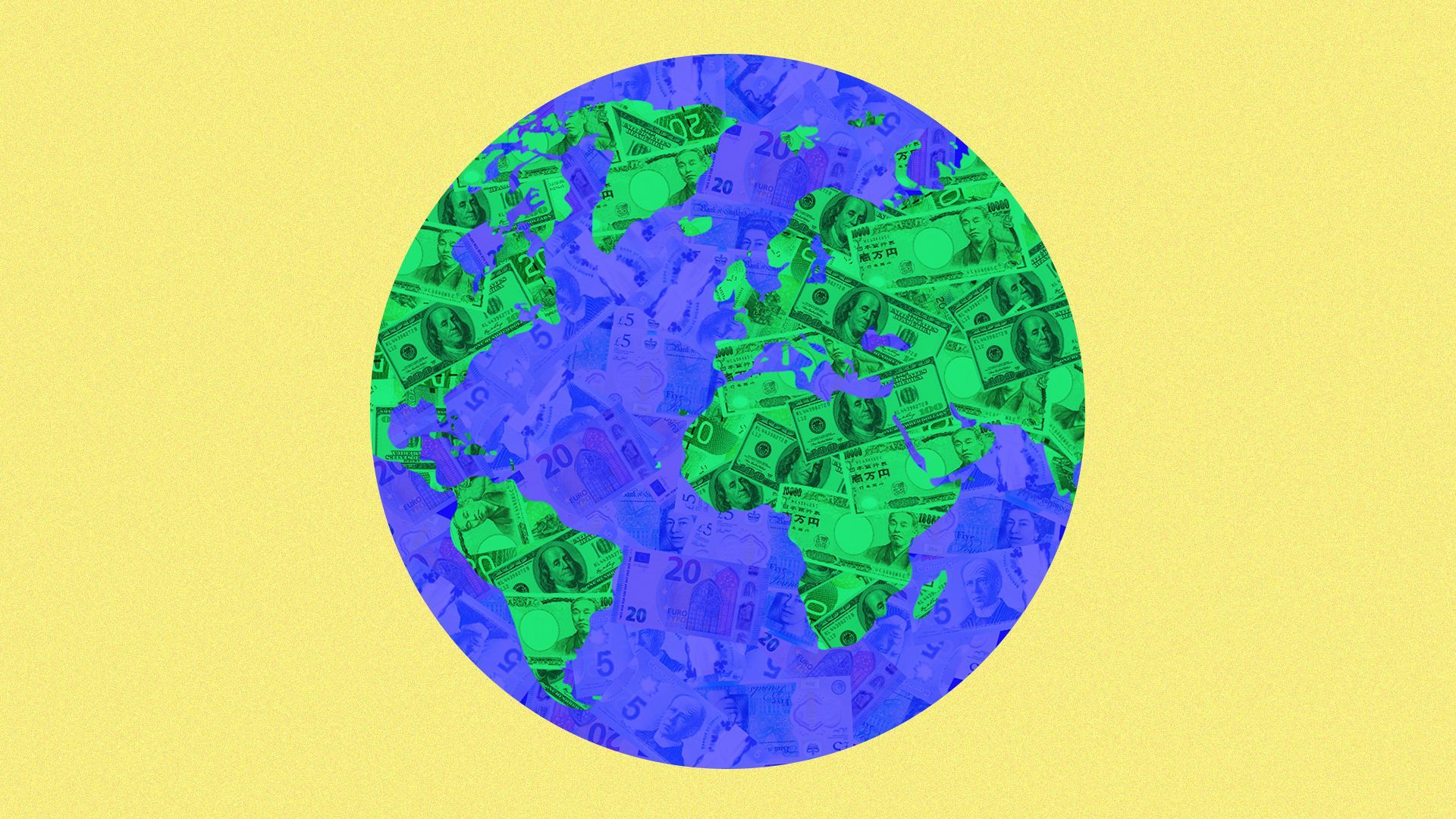| | | | | | | Presented By Northern Trust | | | | Axios Markets | | By Kate Marino ·Sep 01, 2021 | | ☀️ Good morning, Markets readers! 🍿What I'm watching: My foray into '80s movies continued with the finance classic, "Working Girl." As with many films of the era, it's basically a story about sexual harassment, before that was really even a thing. - 🙋♀️Serious question about the plot … that's not how M&A deals actually work, right!? Correct me if I'm wrong.
Today's newsletter is 1,319 words, 5 minutes. | | | | | | 1 big thing: There's no such thing as an independent central bank |  | | | Illustration: Sarah Grillo/Axios | | | | The skirmish over Jay Powell's future as Fed chair provides a glimpse of a much bigger fight — one that could mark the beginning of the end of the modern era of independent central banking writes Axios' Felix Salmon. Why it matters: Powell epitomizes the way in which central banks, working alongside the government, took on the role of rescuing the economy from the shock of the pandemic. Now some lawmakers want to keep the relationship much closer than it has been in recent decades, to harness some of the power only central banks have. The big picture: Central banks (the Federal Reserve, in particular) have never been more important, or more powerful. - The other side: Central banks have also never been as constrained in their range of possible actions. The natural interest rate is close to zero, which means that their main policy tool — the ability to set interest rates — also has to remain near zero.
Driving the news: Left-wing members of Congress have asked President Biden to replace Powell as Fed chair, saying that they want a "whole of government approach" to eliminating climate risk. Between the lines: The letter clearly considers the central bank to be part of the government, rather than an independent agency working within a relatively narrow mandate. - The letter makes clear that central bank decisions are unavoidably political, especially when it comes to the issue of climate change. The Fed is either going to pursue a zero-carbon agenda or it isn't, and either way, it's going to upset certain politicians.
- The EU implicitly capitulated to the reality of a political central bank when it appointed a politician, rather than an economist, to lead the European Central Bank.
Powell has a strong case that he stayed comfortably within the Fed's narrow mandates. Still, many of his programs were unprecedented, meaning the Fed is vulnerable to charges of mission creep. - The debate over Powell's renomination is really a debate over the degree to which Fed mission creep is something to be embraced and extended, rather than accepted only as a necessary evil.
The bottom line: Congressional gridlock means that the official terms of the Fed's mandate aren't going to change any time soon. - Unofficially, however, it has already been moving toward a greater emphasis on tackling inequality, which is nowhere in the mandate. If Biden is serious about the importance of the zero-carbon agenda, it makes sense that he'd want someone sympathetic to that view at the helm of the Fed.
|     | | | | | | 2. Catch up quick | | Intuit is in talks to buy Mailchimp for more than $10 billion. (If the final figure gets to $12 billion, that would make Mailchimp America's 10th dragon.) The email marketing firm is 100% owned by its two founders, Ben Chestnut and Dan Kurzius. (Bloomberg) A pilots union sued Southwest Airlines, challenging several changes to working conditions, including forced time off and scaled back benefits, that the company implemented during the COVID-19 pandemic. (Reuters) - Fortune also postponed its CEO Initiative conference after its journalists, who have been in contract talks for almost two years, said they would picket the event. (Daily Beast)
The Biden administration is expected to unveil a plan to help address a shortage of entry-level homes and rental properties in the U.S. (WSJ) |     | | | | | | 3. Afghanistan's money problems |  | | | Afghans queue up as they wait for the banks to open in Kabul on Aug. 31, 2021. Photo: Aamir QURESHI/Getty Images | | | | Afghanistan's humanitarian crisis is inextricably tied to its crumbling finances. U.S. sanctions on the Taliban, stemming from 2001, are now causing a flight of capital and aid from the country as the distinction between providing services to Taliban and non-Taliban actors becomes more difficult to vet. Why it matters: The Taliban's takeover of Afghanistan's government put U.S. financial services companies squarely in the middle of the geopolitical clash. - Afghanistan's economy has been extremely dependent on foreign investment and aid, as Foreign Policy columnist Adam Tooze wrote in a recent column.
Catch up quick: Wire transfer companies MoneyGram and Western Union froze customer payments to Afghanistan last week, the WSJ reported. MoneyGram just entered the market in the early 2000s, shortly after the U.S. presence there began, CEO Alex Holmes tells Axios. - Afghanistan is a small market for the company — but remittances "play a pivotal role in the livelihood of the Afghan people," Holmes says. Remittances account for 4% of Afghanistan's GDP or about $800 million per year.
- The diaspora from Afghanistan is spread out around the world. MoneyGram has a significant volume of customers who send money into the country from the U.S., Germany, Canada and the U.K., adds Holmes.
State of play: MoneyGram's decision to suspend transfers to recipients in Afghanistan was driven by guidance directly from the Biden administration, says Holmes. The backdrop: Many banks in Afghanistan have been closed since Aug. 15. - The Biden administration froze access to Afghanistan's central bank reserves, and the International Monetary Fund and World Bank have suspended funding in the country.
- There's a new interim central bank head appointed by the Taliban after the previous central banker fled the country.
- The country faces a shortage of cash, and the Afghani currency has plummeted in value.
What's next: U.S. financial institutions are looking for more guidance from the Treasury Department. - Holmes adds that MoneyGram also wants direction from partner banks that requested the suspension of its services, as well as from the Afghanistan Banks Association.
|     | | | | | | A message from Northern Trust | | Market Currents podcast: Listen now | | |  | | | | Market Currents, a new podcast from The Northern Trust Institute, explores today's most hotly debated investment topics. Join host Katie Nixon as she interviews industry experts to investigate the evidence on both sides by separating facts, myths and theories. | | | | | | 4. Allbirds has a new-fangled IPO |  | | | Illustration: Shoshana Gordon/Axios | | | | Allbirds is getting ready to go public and wants to do it via a process it dubs a "Sustainable Public Equity Offering." Driving the news: The company, which makes shoes using sustainable materials, publicly filed its IPO documents on Tuesday. Why it matters: Allbirds aims to pioneer the "SPO" framework, in which a company going public would need to meet certain environmental, social and governance (ESG) criteria in order to qualify for the title. Our thought bubble, via Axios' Kia Kokalitcheva: Allbirds' SPO is mostly a branding exercise since the public listing and securities structure remains pretty traditional. But given the uptick in interest in ESG standards — including from the Securities and Exchange Commission — the company's efforts to codify certain sustainability pledges could prove ahead of the curve. State of play: Allbirds developed the SPO criteria with advisory firm BSR and other market participants. - Those criteria include requirements that the company engage a third-party ESG reviewer, clearly articulate how ESG impact is embedded in its business model, and commit to annual reporting on key ESG factors, among other items.
The bottom line: Other than that, it's a regular IPO. |     | | |  | | | | If you like this newsletter, your friends may, too! Refer your friends and get free Axios swag when they sign up. | | | | | | | | 5. Extreme weather adds to crop issues |  S&P Capital IQ; Chart: Axios Visuals This year's extreme weather, caused by climate change, is impacting crops to extremes that farmers haven't seen in their lifetimes, Axios' Hope King writes. Catch up quick: Prolonged heat waves and droughts have caused this year's corn, soybean, almond, honey, citrus and avocado production to crash and prices to skyrocket. - Hurricane Ida dealt the latest blow: Key agricultural ports in New Orleans are now shut, trapping corn, grain and soy exports — this time sending futures contracts down in expectation of a supply glut.
Why it matters: Some farmers, already hard hit by the health and economic effects of COVID-19, are debating whether they should continue farming at all. What they're saying: "In a normal year we might see one hot spell, or we might see one dry spell, or one cold spell, we've had all those this year," Mark Mueller, director of the Iowa Corn Growers Association, told KCRG in Cedar Rapids. By the numbers: The median prices of corn and soybeans remain near their highest points this year. In the late spring, they'd risen nearly 63% and 48%, respectively, since August 2020, according to S&P Capital IQ. - The price of wheat rose about 40% since last year but has since come down a bit.
The big picture: Hunger was already on the rise before the pandemic. The world can't afford food production issues when the health crisis and supply chain-related problems haven't yet been resolved. |     | | | | | | A message from Northern Trust | | Trusts and sustainable investing: Building the bridge | | |  | | | | Sustainable investing is on the rise. But one category of investors remains on the sidelines: trustees of personal trusts. Learn how grantors, beneficiaries and trustees can bridge the gap between sustainable preferences and fiduciary duties. | | | | ✉️Send tips and feedback to kate.marino@axios.com or hit me up on Twitter @thekatemarino. |  | | It'll help you deliver employee communications more effectively. | | | | | | Axios thanks our partners for supporting our newsletters. If you're interested in advertising, learn more here.
Sponsorship has no influence on editorial content. Axios, 3100 Clarendon Blvd, Suite 1300, Arlington VA 22201 | | | You received this email because you signed up for newsletters from Axios.
Change your preferences or unsubscribe here. | | | Was this email forwarded to you?
Sign up now to get Axios in your inbox. | | | | Follow Axios on social media:    | | | | | |











No comments:
Post a Comment